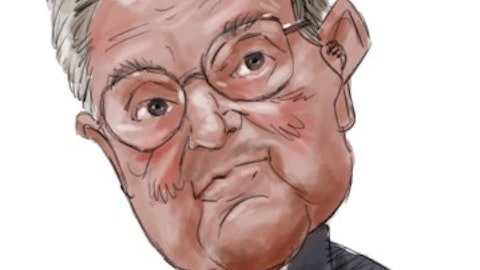The returns of the U.S. equity markets were quite disappointing in the third quarter, wiping most of the gains registered before and offsetting the year-to-date returns of all major indices. The S&P 500 fell by 6.94% during the three-month period between July and September, while the Russell 2000 Index declined by 11.92%.
Investors were also affected by the market turmoil during the third quarter, with the equity portfolios of even most conservative funds edging down during this period. Among the investors we track, the 13F portfolio of Stephen Mandel’s Lone Pine Capital did not deliver a strong performance either. Based on our calculations, Lone Pine’s 46 positions in companies with a market cap of at least $1 billion registered a weighted average decline of 8.17% in the third-quarter. However, it is worth pointing out that this figure represents an estimate of the returns of only a fraction of the fund’s positions, which could be substantially different from the actual returns. In the following article we will discuss some of Stephen Mandel’s most prominent stock picks, which messed around with his fund’s performance during the latest quarter.

Lone Pine Capital LLC is a long/short hedge fund launched by Tiger Cub Stephen Mandel back in 1997. The money manager had served as Senior Managing Director and Consumer Analyst at Julian Robertson’s hedge fund Tiger Management prior to establishing his own shop. In fact, Stephen Mandel is considered one of the most successful Tiger Cubs, who left the legendary hedge fund to start their own investment vehicles. Lone Pine Capital employs in-depth fundamental analysis and uses a bottom-up stock picking approach. Its 13F filing for the June quarter reveals that the Greenwich-based investment firm manages an equity portfolio with a market value of $26.73 billion as of June 30.
Follow Stephen Frank Mandel Jr.'s Lone Pine Capital
But why do we track hedge fund activity? From one point of view we can argue that hedge funds are consistently underperforming, when it comes to net returns over the last three years, when compared to the S&P 500. But that doesn’t mean that we should completely neglect their activity. There are various reasons behind the low hedge fund returns. Our research indicated that hedge funds’ long positions actually beat the market. In our back-tests covering the 1999-2012 period hedge funds’ top small-cap stocks edged the S&P 500 index by double digits annually. The 15 most popular small-cap stock picks among hedge funds also bested passive index funds by 53 percentage points over the past 3 years beginning from September 2012 (read more details here).
To begin with, JD.Com Inc. (ADR) (NASDAQ:JD) represents Lone Pine Capital’s largest equity holding at the end of the second quarter. Stephen Mandel’s investment firm boosted its stake in the Chinese e-commerce company by 3.36 million shares during the second quarter, ending it with 41.89 million shares valued at $1.43 billion. The stock delivered a terrible performance in the third quarter, losing 23.58% during that period. The weakening business conditions in China have put substantial weigh on the stock lately, which is still 16% in the green year-to-date. Just recently, JD.Com Inc. (ADR) (NASDAQ:JD) was upgraded to “Buy” from “Hold” by Deutsche Bank, with a price target of $32. Earlier this year, the company started its foreign market expansion campaign with Russia, after launching a Russian-language website back in June. Tiger Global Management LLC, founded by another Tiger Cub Chase Coleman, owns 70.18 million shares of JD.Com Inc. (ADR) (NASDAQ:JD) as of June 30.
We can refocus our discussion on Valeant Pharmaceuticals Intl Inc. (NYSE:VRX), which represents another major holding of Lone Pine Capital. The Greenwich-based investment firm disclosed an ownership stake of 5.31 million shares in the drug maker through the 13F for the June quarter, which were valued at $1.18 billion. The shares of Valeant Pharmaceuticals Intl Inc. (NYSE:VRX) declined by 19.70% in the third-quarter, but they are still 24% in the green year-to-date. The stock took another hit on Thursday on the back of the news that the company received subpoenas from federal prosecutors regarding the pricing of its drugs (see details). Still, Bill Ackman of Pershing Square Capital Management reckons that Valeant’s stock has the most attractive risk/reward potential from his portfolio (read more details here). The activist investor holds 19.47 million shares of Valeant Pharmaceuticals Intl Inc. (NYSE:VRX) as of June 30.
Follow Bausch Health Companies Inc. (NYSE:BHC)
Follow Bausch Health Companies Inc. (NYSE:BHC)
Receive real-time insider trading and news alerts
Let’s turn the page for the other three tasty stock picks of the reputable Tiger Cub.
Moving on to the next victim of the recent broader market sell-off, Lone Pine Capital holds 9.73 million shares of Mastercard Inc. (NYSE:MA) as of June 30 after reducing its stake by 3.25 million shares during the second quarter. The aforementioned stake was valued at $909.25 million at the end of June. Mastercard Inc. (NYSE:MA)’s stock lost roughly 3.43% during the third quarter, but it managed to narrow down all the losses caused by the August sell-off. In fact, the shares of the company have advanced by more than 13% since the beginning of the year. It has been rumored that China intends to curb cash withdrawals by Chinese citizens using bank cards outside the country, in an attempt to hinder the immense capital outflow caused by the slumping economy. This might put some downward pressure on the company’s top-line, but this should merely serve as a transitory headwind. Andreas Halvorsen’s Viking Global is among the largest stockholders of Mastercard Inc. (NYSE:MA) within our database, holding 8.22 million shares.
Follow Mastercard Inc (NYSE:MA)
Follow Mastercard Inc (NYSE:MA)
Receive real-time insider trading and news alerts
Let’s now take a look at Lone Pine Capital’s position in Facebook Inc. (NASDAQ:FB), which saw its stock gain 4.81% during the third quarter. The investment firm reported owning 9.76 million shares in the tech giant through the 13F filing for the June quarter, which were worth $837.21 million on June 30. This marked an increase of 1.65 million shares quarter-over-quarter. It is already common knowledge that Facebook Inc. (NASDAQ:FB)’s valuation relies on the ability of its management to monetize the recently-made acquisitions (i.e. Instagram and WhatsApp). The company has already proven to be successful in making money on its photo-sharing platform, so the market awaits the monetization efforts on its WhatsApp. It remains to see whether the company will be able to recuperate its $21.8 billion investment. Ken Griffin’s Citadel Investment Group is bullish on Facebook Inc. (NASDAQ:FB), owning a stake of 5.07 million shares as of June 30.
Follow Meta Platforms Inc. (NASDAQ:META)
Follow Meta Platforms Inc. (NASDAQ:META)
Receive real-time insider trading and news alerts
Last but not least, Lone Pine Capital disclosed an ownership stake of 7.16 million shares in Nike Inc. (NYSE:NKE) through its latest 13F filing with the SEC, which was valued at $777.98 million at the end of June. Stephen Mandel’s firm increased its stake in Nike by 1.48 million shares during the second quarter. The stock was one of the gainers in the fund’s equity portfolios, having advanced by 14.13% between July and September. The shares of Nike Inc. (NYSE:NKE) have advanced by more than 35% since the beginning of the year and there are no signs they will stop rising soon enough. Just recently, the company announced a new revenue target of $50 billion by the end of 2020 and said that it expects annual revenue growth of high single-digit to low double-digit. Cliff Asness’ AQR Capital Management holds 1.75 million shares of Nike Inc. (NYSE:NKE) as of June 30, making in one of the top stockholders within our database.
Follow Nike Inc. (NYSE:NKE)
Follow Nike Inc. (NYSE:NKE)
Receive real-time insider trading and news alerts
Disclosure: None





